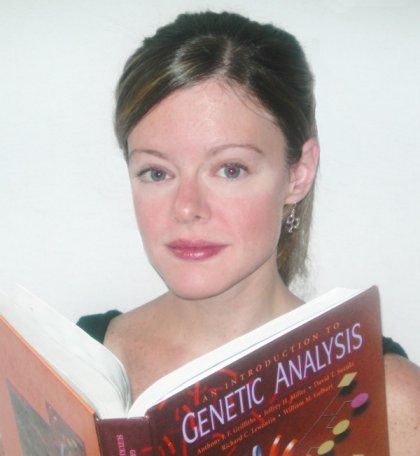
I have a confession to make. Actually, I have two.
Last week, when I was planning out this project, I decided that for my final entry I'd consult three more experts, all of them Harvard doctors and people I trust: my husband, my primary-care provider, and my academic mentor. This was "personal" genomics, and I wanted advice from people who understood the genomics but also the personal; the science but also me.
Before the first entry went live, I sat down with my husband over dinner and asked him what he thought. "Buy the test if you want to," he said—"but why would you want to? You can't do anything with it." My husband is a surgeon (perhaps you've heard the surgeon's motto: "When in doubt, cut it out") and a pragmatist, and he was judging the test based on what he perceived as its lack of practical medical value. It was as if I'd asked him whether I should buy an expensive handbag or a plane ticket to Santa Fe: OK, if you really think you'll get several hundred dollars' worth of use out of it. But he didn't think he would.
I went next to David Altshuler, an extraordinary geneticist at Harvard who will be teaching me medical genetics this winter and who serves as a frequent source for me. I expected him to tell me roughly what my husband had: that he didn't think wide-scale genetic tests were yet predictive enough to provide any medical benefits. (He's been quoted to that effect before.) He did ask me some challenging questions, trying to help me figure out why I was interested in the tests. He said he believed I could "learn some things about epidemiologic risk from them," but that those things should only interest me if I had "already exhausted the other risk factors and found that gratifying." Had I canvassed my relatives to put together a complete family history, or gone online to calculate my Framingham Risk Score, or measured my waist-hip ratio? "If you like all that stuff, the genetic stuff should be even better," he said. "But I don't know many people who actually find risk factors that interesting."
He had a point. I'm pretty sure I've calculated my Framingham score, but I've never been one of those people who's constantly trying to hack her own body with diets and who looks at the gym as an experiment rather than a simple way of keeping fit and sane. I love medicine and science, but my own health just isn't something I think about that much. I also have the luxury of not needing the test to serve any particular medical function. My interest in it is purely intellectual.
Similarly, Altshuler said, the ancestry part of the test could be fun and maybe even educational, but had I already delved into traditional genealogy? Sure, I had a long list of ancestors and some amusing family stories, but a hobbyist I was not.
I turned the questions back on him. Was there anything about the tests he found interesting? There was: a social movement had sprung up around them based on things he was "amazed had gotten connected to genomics—'Web 2.0,' 'straight to the people' … It's about the democratization of information. It's, 'out of technology will come a better life.' " The "heightened specter of regulation," as one of our contributors put it, had only made that movement more vocal. Altshuler preferred his activism in a more conventional flavor—if he wanted to join a social movement, he said, he wouldn't give a company money to get back data, he'd march on Washington—but he did identify with parts of it. What was it, he wondered, about "learning your genome and taking control of it that resonates with this segment of society?"
I had seen this phenomenon earlier this year at a conference that was sort of a Woodstock for personal genomics enthusiasts—the Genomes Environments Traits meeting, led by the Harvard biochemist George Church (who, for the record, thinks I should get tested, but with whole-genome sequencing, which for the moment is much more expensive than the tests made by 23andMe and deCODE). I had also seen the "democratization of information" theme threading through the blogs of our project contributors, some of whom are direct-to-consumer genetic testing's early adopters and advocates. During an informal conversation, one of them had tossed off a thought that has been stuck in my head all week: a secondary reason to get the test, he said, was that among certain people, having one's DNA scanned is "the currency of the realm."
I'm not really part of the personal genomics community. But I wouldn't mind having some currency in it. I like the people who make it up, and I share many of their values: biology is cool, connecting with others is important, it's better to know something than not know it. I've found that this weeklong project has forced me to articulate and commit to those values. So here's my first confession: throughout this week, regardless of my personal decision, I've known all along that I would come back to the question of what people can learn from genetic testing.
The tests are a powerful tool for teaching about DNA and health risks and the messy ways in which science gets done, and in that sense alone they have value. But as long as the decision to test or not to test is yours to make, and as long as you take it seriously, the process of choosing can also teach you a lot about what you think, politically and philosophically speaking. Simply by existing and being available on the market, the tests can educate you about your own beliefs as well as your genome. In my case, because I was able to spend a lot of time discussing them with thoughtful contributors and readers, they showed me what I most believe in: education, curiosity, transparency, full head-on engagement with life and all its imperfections.
I had thought all of this through by yesterday afternoon around 2 p.m., when I finally pulled my testing kit out of its box and found to my complete surprise that I was—there's just no other word—scared of it.
Rationally, of course, I knew I had nothing to be scared of. I wouldn't put too much stock in the incomplete science behind the test or make bad decisions based on it, and I really did want to know the results, even if they were foreboding: I said earlier in this project that I would want to learn my APOE status, and that is still true. But my response to the kit itself was not rational. It was centered on the fact that whether or not the test qualifies as a medical device under FDA rules, it looks like one. It has a biohazard sticker on it! Even as the logical part of my brain was evenly listing all the arguments in favor of my taking the test, the emotional part was panicking, because it was totally unused to seeing things that look like medical devices outside a medical context.
It's a good thing that right then my primary-care provider called.
We had been trying to connect for the whole week, but like most PCPs, she was slammed. I thought I had made peace with the fact that I would be making my decision without her input (wasn't that what "democratization of information" was all about?), but clearly, given my breathless reaction to taking the test kit out of its box, I hadn't quite gotten there. My doctor helped me calm down. She talked me through all the issues I'd been thinking about intellectually, only from my personal perspective. She didn't try to influence me. She listened. And then she said something interesting. She hadn't seen many patients asking about these tests yet, but she was looking forward to providing more of them with guidance in the future: not forcing her opinions on them, or trying to talk them out of taking the tests, but gently helping them decide what to do, if they wanted her to. That was what she was doing for me. Clearly, given the fact that I'd just spent a week soliciting as many opinions as I could on whether I should take this test, I was the kind of person who liked to have guidance. Another thing learned. I hung up and I decided I was ready to take the test.
Second confession: it didn't occur to me until this morning that I had just short-circuited my entire project by rendering my test not-quite-direct-to-consumer – because I had asked for my doctor's involvement.
But that was my choice. That's how I think it should be. Some people are ready to jump off the cliff and learn all they can about their own genomes with no medical professionals to guide them. We should let them do that. They're adults. Some of us need a little more help easing into the personal genomics era, and that's OK too. Some people have little interest in learning about their genomes. While I don't quite understand that attitude, because I am both a romantic and a geek—this stuff is really fun, you guys! Have you seen what you can do with your raw data on Promethease?—I can't force people to find biology as fascinating as I do. All I can do is try to explain to them why I love it.
Now, I'm going to take my test. I'll be waiting for the results for a few weeks. Maybe I'll write something about them. Maybe I won't. That's another decision.
Follow Mary on Twitter as she makes her decision, or add your opinion using the #DNADilemma hashtag.
DNA Dilemma: The Complete Series
Monday: Is Now the Time to Test?
Tuesday: What Can I Learn From This Test?
Wednesday: How Meaningful Are the Results?
Thursday: Should These Tests Be on the Market?
Friday: My Genome, Myself: I Make My Decision
Recommended Reading: Further Articles, Essays, and Web Sites
DNA Dilemma FAQs: You're Doing What, Exactly?
Uncommon Knowledge
Newsweek is committed to challenging conventional wisdom and finding connections in the search for common ground.
Newsweek is committed to challenging conventional wisdom and finding connections in the search for common ground.
About the writer
To read how Newsweek uses AI as a newsroom tool, Click here.





